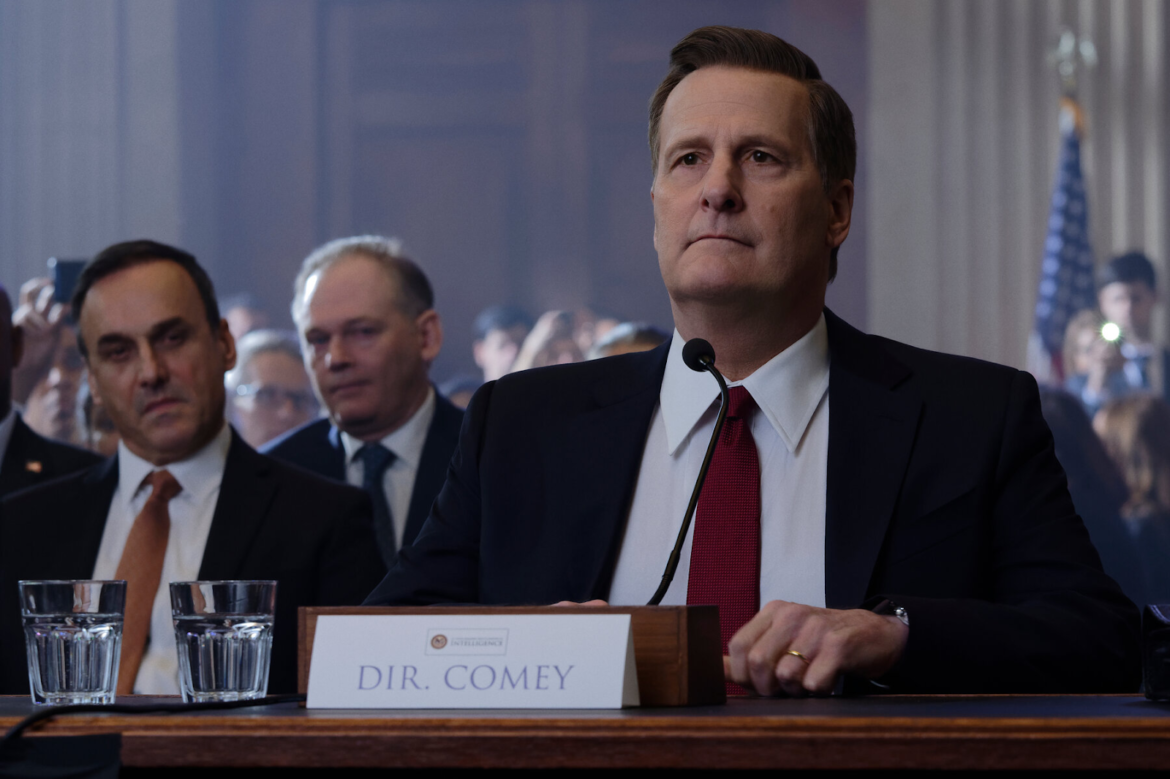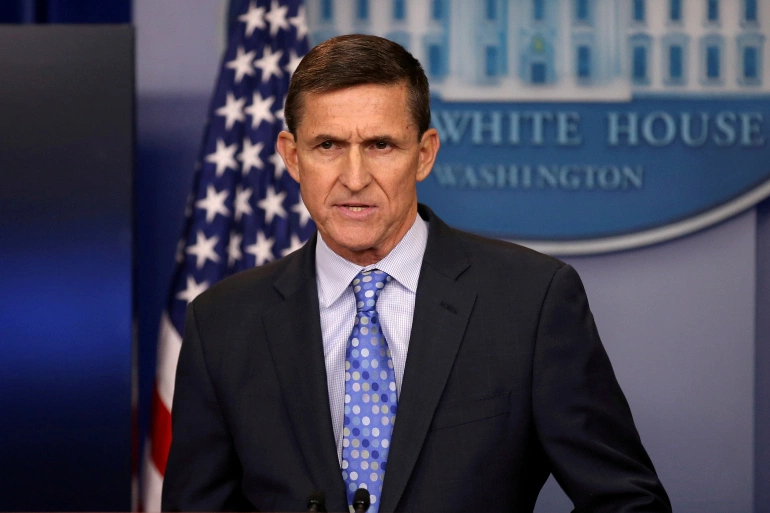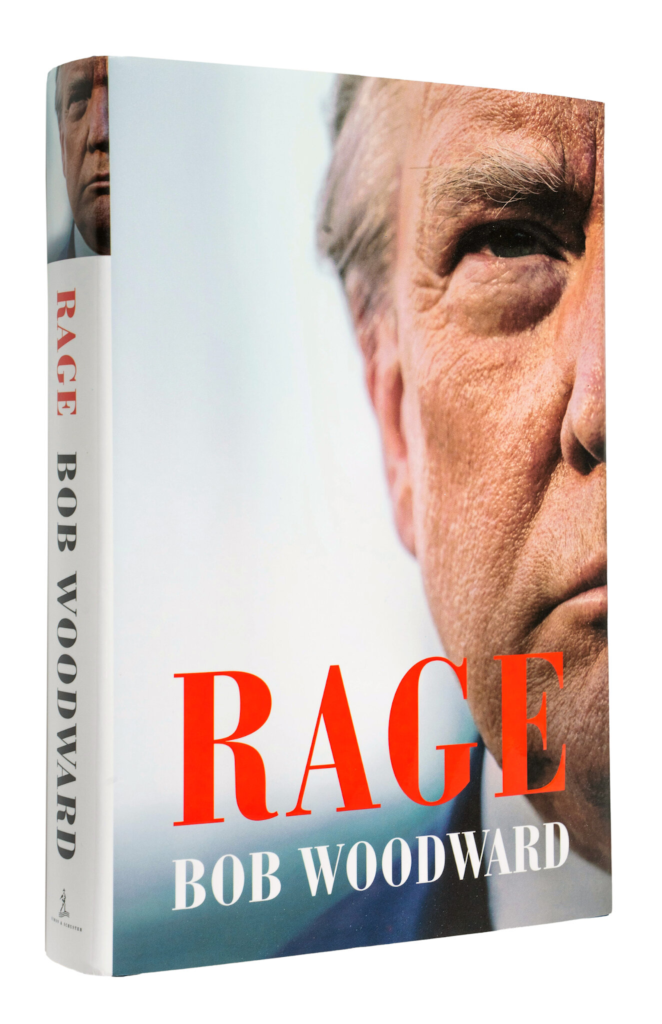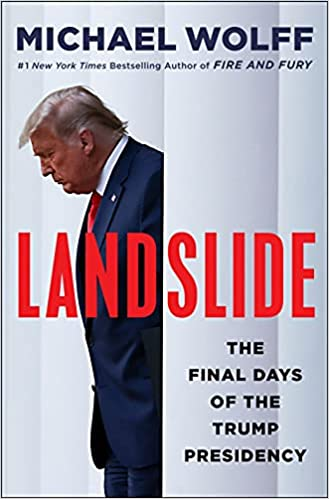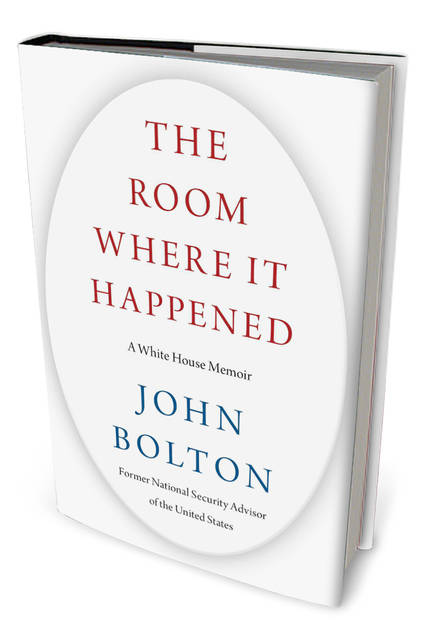I don’t know about you, but I think I smell Oscar Gold.
– Someone, probably.
On May 9, 2017 FBI director James Comey was fired by then-President Trump, citing the bureau’s ongoing investigations into alleged ties between the presidential candidate’s campaign and Russian agents. A few weeks later, Comey went to the U.S. Senate Intelligence Committee to testify on the matter of how much Comey’s investigation was tied to the Trump administration. It was a s*** show.
I remember back when Comey was testifying before the senate committee with regards to his firing (before those hearings became just another sideshow of the whirlwind Trump era) and remembered thinking to myself:
“Boy, 10 years from now somebody’s gonna make a movie out of this…”
– Peter Hortensius, 2017
Even then, I emphasized “10 years” in my head because that seemed the point in time where it would one day be appropriate to look back at this crazy time in the form of a political thriller.
With regards to Trump, he may be out of office (and hopefully he stays that way), but in these deeply divided times I think the last thing people want right now is to revisit things that are still so fresh in our minds.
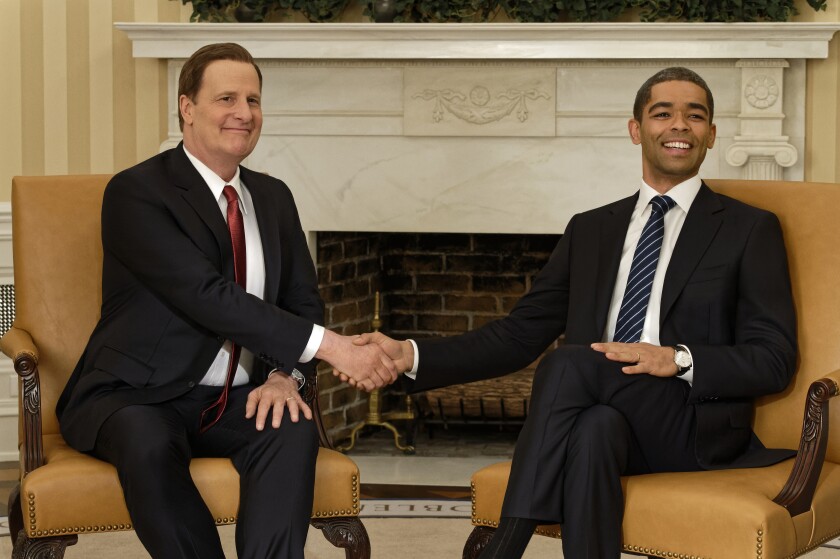
It turns out I would not have to wait long for the networks to cash in. In September 2020 Showtime released The Comey Rule – a two-part TV movie starring Jeff Daniels and Brendan Gleeson, barely 3 years after the events transpired. Based on Comey’s own book, A Higher Loyalty, it follows his entire tenure from being hired by Obama (who looks like a college student in this movie), his controversial handling of the Hillary email scandal, and ultimately to his infamous firing and testimony. Essentially this is 2016-2017: The Recap: The Movie.
Part 1 – What The Comey Rule Does Wrong
My chief problem with this film is that production began less than two years after said event happened. At this point in the American political zeitgeist (2019), tackling Trump in a serious light had already become stale, pretentious, and superfluous. His voters and opposition alike already knew what he was about, how he acts off-camera, and what “doing business” means Mr. Art of the Deal. Coverage of the event and the fallout were headline news for months. These films added nothing new to the conversation.
Another thing to consider is that there are elements about Trump’s alleged ties to Russia and Comey’s investigation that are still being uncovered and declassified. Whenever major geopolitical events unfold, the whole story usually never comes completely together until years later, hence why we usually don’t make the movie until at least 5 years after that event. By releasing early in order to be “trendy”, you’re almost guaranteed to be telling a lie by omission. Just look at how CNN’s “be first and be loud” philosophy has tarnished their image.

On a side note, another problem with having a film made just a few years later is the fact some of the actors look nothing like the real-life people they are portraying. Don’t get me wrong, I understand that when it comes to biopics you are not going to get the people who look 100% like their real-life counterparts – but these real people being on the news so much are so ingrained into our current memory that it is jarring to have someone with a different face play them.
Some of these castings were good. The actors they got to play Sally Yates, Andrew McCabe, and Rod Rosenstein looked great. Others, like William Sadler‘s portrayal of Michael Flynn (above) were such bad misses that I honestly thought that was supposed to be Jeff Sessions.
In that regard I cannot avoid talking about Brenden Gleeson’s portrayal of Trump. Don’t get me wrong, Gleeson is a great actor and I’ve seen him play many stock villain characters very well. However, Trump is simply not someone you can simply direct as just another stock villain, you have to portray him with either over-the-top ham (see: Alec Baldwin’s SNL rendition) or with rage-inducing greasy cringe. I think Gleeson (or at least his direction) wasn’t able to go all-out with this kind of grounded role. Restrained performances for villains can work for the right characters, but this is not the role where you can have it both ways. Unless your film is made as a true satire, there is no way anyone could portray Donald Trump seriously. I’m always aware I’m watching an actor’s imitation of Trump, rather than their disappearance into the role. As such, all serious portrayals I end up seeing ultimately come across as cringe-y or pandering.
Part 2 – Portrayals of Recent(ish) Politics Done Right
There are other films made in a short time frame that can be exempt from this rule. Zero Dark Thirty, for example, was made a year after the 2011 Bin-Laden raid. However, that film focused on the execution of a singular famous raid and the decade’s worth of intelligence gathering/politicking it took to get there. More importantly, the scope of that film followed a relatively self-contained event that didn’t leave much in the way of long-term political ramifications. (well other than the Pakistani government’s anger over the brief “invasion”, but that’s what happens when you let HVTs hang out on your back porch for the better half of a decade…)
Now I’m not saying you can’t make a movie based on something that happened a few years ago. I believe that if you want the true story to be told, narratives would be wise to wait a good amount of time before they release. This is what keeps you from becoming dated as current events fade from the public consciousness.
The 2018 film Vice follows the career of former VPOTUS Dick Cheney and was produced over a decade after the 2nd Bush administration – plenty of time to look back and depict Cheney with an honest and clear palette (albeit through a Hollywood lens). It is also not executed like a standard biopic – where the camera only focuses on the title character in every scene – it is presented much more like a dark comedy and even has a kind of Narcos-style narration.
We now live in a time where good political satire is a dying art. Make no mistake, Trump’s own branding is more or less the cause of this phenomena, as at this point criticizing him lumps you in with the “mainstream media” and comes off as beating a dead horse, even to your own echo chamber. Trump is simply not someone that you can make into an Oscar-baiting film off of. Instead, he can be taken on much like South Park where they tackle people and events surrounding Trump, rather than Trump himself.
Part 3 – The Story Continues
One particular aspect of The Comey Rule we should discuss is how it frames the tale. The film starts with former Deputy Attorney General Rod Rsenstein in April 2019 – shortly after resigning – telling the story of the whole Comey fiasco in the form of a flashback; as if James Comey was dead and this film was his eulogy.
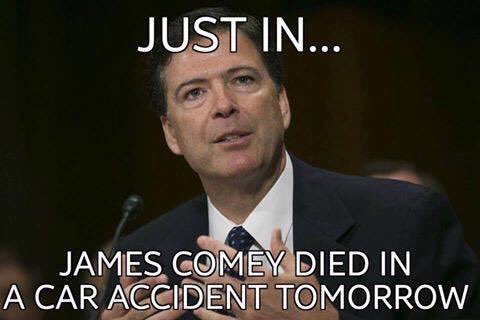
What bothers me with the media using this kind of “it’s all in the past” storytelling is that these films act like this history has already been written in its entirety. The sad truth is that it’s very much not – the story of the Trump era is far from over, and we should treat these events as such. Newspapers are written chronologically; history is written retroactively.
“If it can’t order a beer then it’s not history.”
– Every History S***Post group I’ve ever been in
Similar but different circumstances apply to recent books by authors like Micheal Wolff and Bob Woodward that detail the internal and external chaos of Trump’s administration over his tenure. These works were based on a series of interviews with a variety of White House aids, current and former. However, these were still composed as an individual author’s interpretation rather than first hand accounts, unlike John Bolton’s The Room where it Happened. What these works have in common (apart from the awkward T in the room) is that they serve more as primary/secondary sources, rather than presenting themselves as a complete narrative for the sake of entertainment. These provide source material for someone else’s interpretation and adaptations when the time comes for entertainment over exposing facts.
When taking additional consideration of everything that has happened since Trump’s departure (circa August, 2021), there are no signs he is stepping down from the political stage. If anything, he’s trying to get back in with his persistent “Big Lie” that the 2020 election was stolen. Until some great force (or mass tragedy) stops his cult-like following, we don’t even know what the real story of the Trump era will be. What’s the climax? The insurrection? The pandemic response? The elections/inaugurations of ’22 and ’24? Ted Cruz finally beaming up to the mothership?
Make no mistake, someday we will see a legitimately great film about the insides of the Trump administration and its full effect on the American public. Until then, people are still going to keep trying to be the first ones to get it “right”. Even we at CrudeMirror.com have taken a swing – one of our very first articles was a proposed “Dreamcast” depicting the Trump administration as a farcical satire, Death of Stalin-style. However, we also very clearly state that such a project would need to be pursued at least a decade out – we’re not trying to ramp up production while the story is still being written.
What matters with these biopics is that they need to be handled with enough maturity and honesty so that we can both believe these events happened and reflect on them. To do this, stories need a combination of perspective, context, and all the facts so the story can be told and re-told with credibility.
As an astute example – imagine if someone released a film about the invasion of Iraq and released it in 2004 (just in time for re-elections!). Imagine a patriotic fluff film about saving Iraq from Saddam and his totally existent WMDs, ending with Bush’s infamous “Mission Accomplished” aircraft carrier address. While it may get some good ‘ol “Ooh-Rah!”s and “Murika F*** Yea!”s at the time, you’d ultimately end up with a cringe-inducing tone-deaf tale, as we’ve all seen how the past few decades has turned out for that region.

Conclusions
My ultimate problem with The Comey Rule is that its rush to production timeline was clearly motivated to somehow influence voters ahead of the 2020 election – to tell “the real story” and make moderates and Trump’s base alike reconsider voting for him a second time.
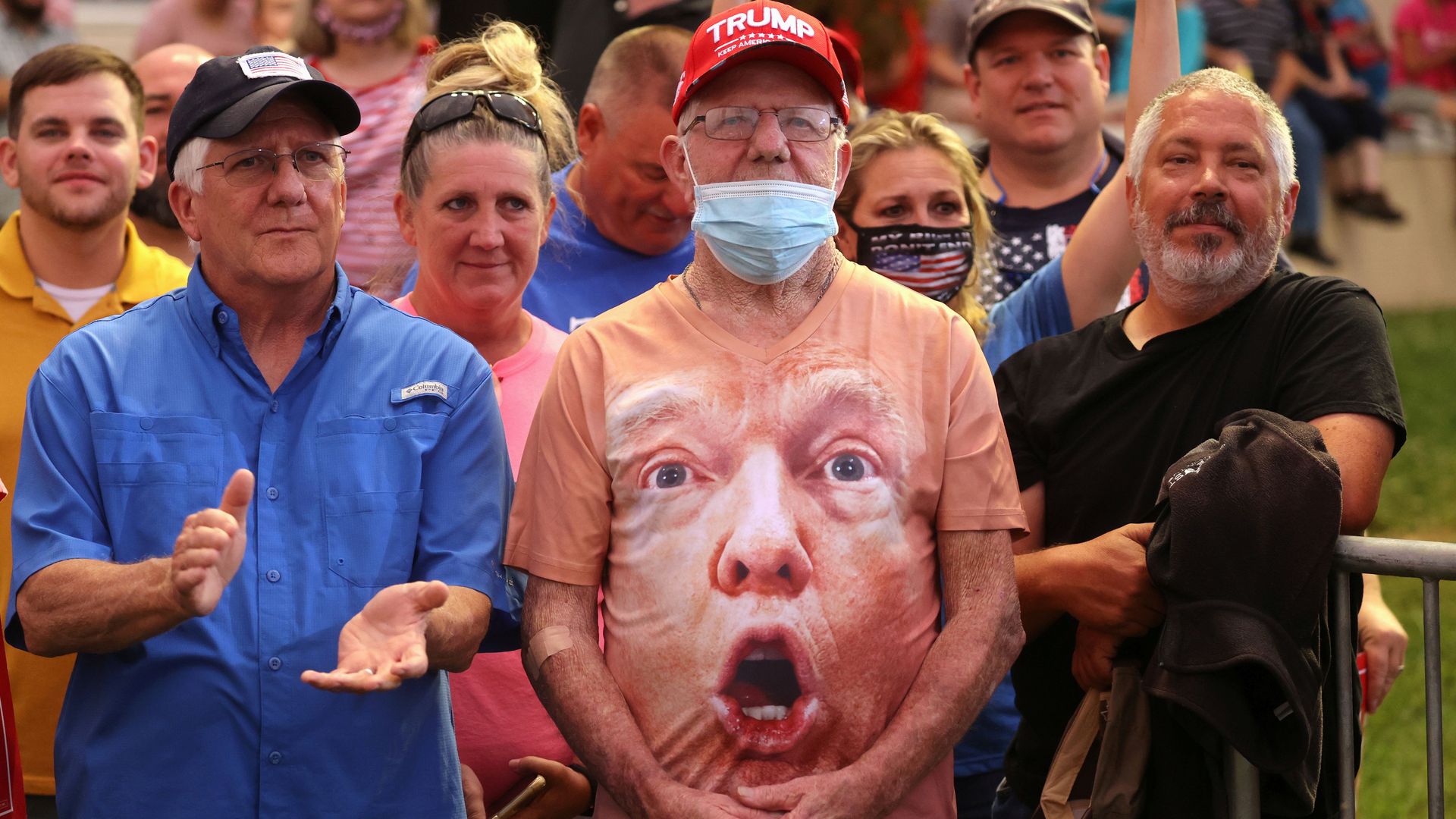
In some ways this reminds me of Dinesh D’Souza‘s 2016 propaganda book Hillary’s America, which was blatant about dissuading America from voting blue in the almost equally harrowing 2016 election. Now Hillary’s America is far worse in comparison (“all democrats are slave-owning godless heathens” and the similar diatribes), but what these two films have in common is that they barely changed anyone’s minds – because they were clearly made for a specific target audience and no one else. One was made for conspiracy theory-based anti-government viewers, the other was clearly made for those who already hate Trump. Preaching to the choir of cultists on both sides of the aisle.
What I want to see more is film and media that pops the disjoint reality bubbles America has been drowning in for the past decade. Good films (especially historical pieces) ask difficult questions and sometimes their is no clear answers. “Could we have lived in a better America if Anthony Wiener kept it in his pants?”, “would the s***show administration have performed better if Trump simply stopped tweeting?”. Exploring both sides of an issue makes drama compelling. Their are no real answers, but it makes settings like this more interesting then a movie glorifying a FBI director who’s incompetent commitment to justice led him to influencing an election with 2w to go, allowing one of the worst possible Americans into our highest office. As much as people want movies to escape from reality, I’m among those people who believe film can help us understand reality, so we don’t fall for the same cynical view that has gripped America after all these years, and still is.
– Peter Hortensius
Head Writer, Crude-Mirror.com
